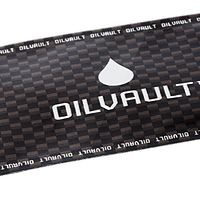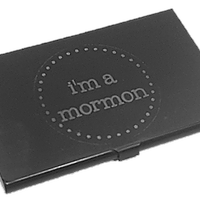Have you ever wondered why we use olive oil for priesthood blessings? I honestly had not thought about it until I started working on Oil Vault. Then I got to thinking, why do we use olive oil instead of something else? There are other types of oil and some blessings do not even use oil.
Does it have something to do with the allegory of the olive tree? The Book of Mormon and the Bible do talk a lot about olive trees. Is that it?
Well apparently I am not the only person to have this question. In an Ensign article in October 1991, D. Kelly Ogden (an assistant professor of ancient scripture at Brigham Young University) shared the answer to this question.
Here is his answer:
The first historical or scriptural mention of anointing with oil dates from the time of Moses. Olive oil was used to anoint the tabernacle of the congregation, the ark of the testimony, and other sacred instruments, as well as to anoint Aaron and his sons. (See Ex. 30:22–31.)
Olive oil was also used to anoint kings and prophets when they were invested with power, received divine approval, and were consecrated to their holy callings. Samuel used oil when he anointed Saul a captain over the Lord’s people. (See 1 Sam. 10:1.) Samuel later anointed David to replace Saul as Israel’s king. (See 1 Sam. 16:13; Ps. 23:5;Ps. 89:20.) Elijah anointed two kings and the man who would succeed him as prophet. (See 1 Kgs. 19:15–16.)
Priests who ministered in the temple also used olive oil as part of their ritual offerings. The Messiah, of whom all the prophets testified, was called in Hebrew Mashiah and in Greek Christos, which means “Anointed One” in both languages.
The use of olive oil for medicinal purposes is illustrated in the parable of the good Samaritan, in which the Samaritan bound up the wounds of the assaulted Jew, “pouring in oil and wine.” (Luke 10:34.) Rabbinical sources of the time attest to the belief that oil and wine had curative and antiseptic properties.
Although Jesus healed many people without anointing them with oil—sometimes even healed a person without touching him or her—it was a general practice for priesthood holders in the Church to anoint the sick with oil. While performing their first missionary labors, the Twelve Apostles “anointed with oil many that were sick, and healed them.” (Mark 6:13.)
The epistle of James records the most detailed description of priesthood administration preserved for us from ancient times: “Is any sick among you? let him call for the elders of the church; and let them pray over him, anointing him with oil in the name of the Lord:
“And the prayer of faith shall save the sick, and the Lord shall raise him up.” (James 5:14–15.)
Why is oil used in administering to the sick? First and foremost, of course, we use olive oil because the Lord has commanded us to do so. The scriptures give us some clues as to why the Lord has so directed us.
On one occasion, Jesus encountered a man who had been blind from birth. The Savior anointed the man’s eyes with clay and then instructed him to go and wash in the pool of Siloam. (See John 9:6–7.) Perhaps the Lord wanted the blind man to be anointed and washed in order for him to be physically involved in the healing process. Likewise, baptism by immersion, the sacramental bread and water, and the laying on of hands and anointing with oil all personally involve the faithful participant in the holy ordinance.
This kind of involvement seems to be aided by the use of symbols. Throughout the ages, symbols—physical objects, substances, and actions—have been used to represent sacred powers and practices. When we are baptized, water is the physical property, or symbol, involved in the ordinance. The water does not cleanse us from sin; it is the faith and repentance that precede our baptism that allow God to grant a remission of our sins.
When we partake of the sacrament, bread and water symbolize the body and blood of the Savior. There is no redeeming value in the bread and water—only in what they represent, which is of infinite worth to us.
So it is with administration to the sick. We apply hands and oil, the physical touch and the tangible substance, but the hands and the oil do not heal. It is faith in Jesus Christ and the power of the priesthood that heals.
So why is olive oil used?
Anciently, oil pressed from olives was considered the cleanest, clearest, brightest-burning, longest-lasting of all animal and vegetable oils. It was also the purest of oils and was thus appropriate for holy anointings. Joseph Fielding Smith has written, “We find through all the prophetic writings that olive trees and olive oil are emblems of sacredness and purity.” (Answers to Gospel Questions, 5 vols., Joseph Fielding Smith, Jr., Salt Lake City: Deseret Book Co., 1957–66, 1:152.)
Is a priesthood administration valid without the use of olive oil? Again, it is not the oil that heals a person, but the prayer of faith and the use of priesthood power. In times of emergency, when no oil is available, it is altogether fitting and proper for priesthood holders to administer to a sick or injured person with no anointing. On this subject, Elder Joseph Fielding Smith wrote:
“There have been cases, sad to relate, where elders of the Church, through lack of understanding, have refused to administer to the sick under conditions where oil could not be had. It is the privilege and duty of the elders to bless the sick by the laying on of hands. If they have pure olive oil which has been consecrated for this purpose, one of them should use it in anointing the sick, and then they should by the laying on of hands seal the anointing. If no oil is to be had, then they should administer by the laying on of hands in the power of the priesthood and in the prayer of faith, that the blessing sought may come through the power of the Spirit of the Lord. This is in accordance with the divine plan inaugurated in the beginning.” (Doctrines of Salvation, comp. Bruce R. McConkie, 3 vols., Salt Lake City: Bookcraft, 1954–56, 3:183.)
We do not know exactly when oil was first used in priesthood ordinances. It is possible that the pattern was instituted in the days of Adam. What is clear, though, is that priesthood holders administer to the sick in the same way priesthood holders did anciently—through anointing with olive oil and the prayer of faith.




cYaZDmrTCQW
PNJyohLjtreAFdM
jHshZakbqQrvAUE
tWMIrAEZYKf
flTYOdVpXBi